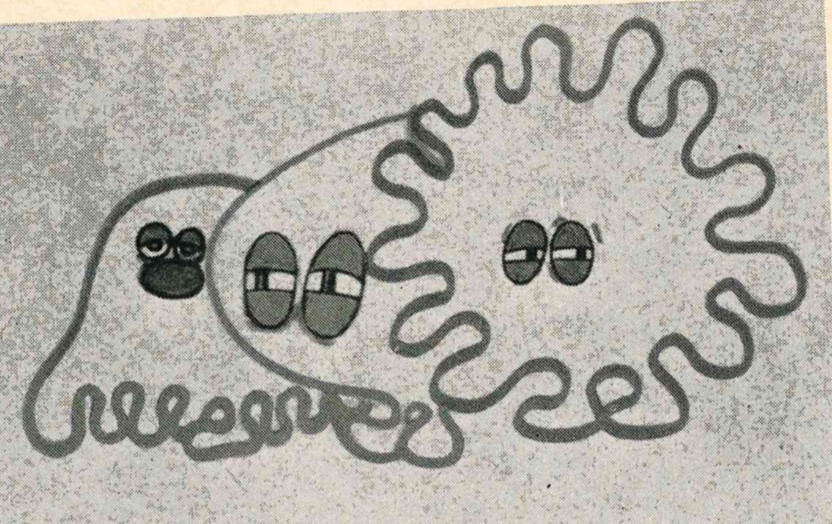Mr Men and Little Miss in advertising
How an adman's industry exit proved to be his greatest gift to advertising

1985 Roger Hargreaves with Mr Beefeater - Campaign Photographs
The bright round grins of characters such as Mr Happy, Little Miss Sunshine and Mr Bump have appeared on the front of so many children’s books over the last five decades that most of us would recognise them in an instant. But beyond the colourful set of ‘Mr Men’ and ‘Little Miss’ characters who feature in picture books, there is a larger cast created for another purpose entirely: from ‘Mr Stupid’ (British Rail, 1977) to ‘Mr Beefeater’ (Beefeater, 1980s-90s) to ‘Little Miss Explorer’ (Heathrow Airport, 2018) the ‘Mr Men and Little Miss’ have long been a favourite in the world of advertising. In fact, it was in this world that the concept was born.
Roger Hargreaves was the creative director of ad agency David Macaulay in the early 1970s when he created a set of commercials for Askit powders featuring simple cartoon shaped characters called ‘The Miseries’. These characters (with names such as ‘Headache’ and ‘Sore Back’) were destined to be the precursor to a series of (less miserable) counterparts starting with the long-armed ‘Mr Tickle’ in 1971. Hargreaves first created these characters as a side project from his advertising career and they quickly became a phenomenon that would delight the world.

1971 Askit - The Miseries
In 1973, Hargreaves assured
Campaign magazine that his foray into children’s books wouldn’t mean the end of his advertising career: “I enjoy it too much,” he told them. But this was not to be the case. Within a few years, Hargreaves had left his agency career behind to draw Mr Men characters full time. Yet this new venture would end up being a far greater gift to the world of advertising.
The power of these colourful characters to sell to children was quickly understood, with Mr Men appearing on products such as cereal boxes, ice lollies and tins of Heinz spaghetti hoops. It was here that they promoted a special offer on Mr Men soft toys: “Aimed at our younger age group – our biggest consumers – these toys also make ideal Christmas presents,” explained product manager Terry Bryan in Heinz’s internal magazine in 1978.
1978 Heinz Spaghetti (MEAL)
It wasn’t until 1985 that the characters entered into their first ad campaign pitched at adults. “I still have a number of friends in the advertising business,” Hargreaves told
Campaign in February, “and while I’ve been approached before for this sort of thing, I thought Olivetti was the right sort of company.” Olivetti ran a series of print and TV adverts for their range of personal computers featuring brand new characters including ‘Mr Amazed’, ‘Mr Neat’ and ‘Mr Calm’ (looking rather different to the character of the same name created just last year for the series’ 50th anniversary).
1985 Olivetti TV still - Washer Fox Coughlan
In a Mr Men promotion for Beefeater restaurants that came soon after this, Hargreaves explained the new potential that was beginning to arise with the passing of time. Whilst earlier campaigns had targeted children alone, Hargreaves now commented that: “The youngsters who used to read my first books are now today’s mums and dads”. The Mr Men and Little Miss could sell to the whole family.
Other the next few decades, there was no end to what products the Mr Men and Little Miss could be found endorsing. Transport ads seemed to be a particular favourite: in a 1996 InterCity train TV ad Mr Clever smugly enjoyed a ‘Business Advance’ ticket; in a 2007 Virgin Atlantic flights billboard Mr Tall happily stretched his legs in an upper class suite; and in a 2016 TfL poster Little Miss Stubborn stubbornly blocked the doors of the London Underground.
1996 InterCity West Coast - Think About It
One of the most successful ads of the 2000s was a TV commercial for Specsavers starring a less-happy-than-usual Mr Happy. Poor old Mr Happy takes a downcast stroll through the streets of ‘Happyland’ distraught that he didn’t get any free extras with his new pair of glasses: “Looks like somebody should’ve gone to Specsavers…”
This ad, animated and narrated in the same style as the 1970s Mr Men TV show, was a direct appeal to the audience’s early childhood memories. Roger Hargreaves’ observation many years earlier was even more true than it had been at the time, and the power of nostalgia proved more powerful than he might even have imagined.
In the twenty-first century, the Mr Men and Little Miss found themselves becoming icons of high fashion (chosen by the likes of Stella McCartney and Paris Hilton), members of royalty (celebrating the 2011 royal wedding with the creation of Little Miss Princess) and even Time Lords, with the release in 2017 of a series of books that were a crossover with Doctor Who.
For the last decade, this wave has been ridden by Sanrio, the owners of Hello Kitty, who bought the rights to the Mr Men and Little Miss in 2011 and have expanded the popularity of the characters by keeping them fashionable, friendly and forever close to the ad industry. Mr First (World First, 2014), Mr Glug (Evian water, 2014) and Little Miss Spice Girls (The Spice Girls, 2017) are just some of the recent additions to the ever-growing cast.

Born Licensing - Don't Say Can*t
And there is no sense that this will change anytime soon. Last year, Born Licensing featured Mr Grumpy as one of the characters in their ‘Don’t Say Can*t’ promotion to encourage businesses and brands to make use of popular characters in their ad campaigns. The Mr Men and Little Miss have proved popular time and time again, and so we can hope and expect to see them continuing to be used creatively in both children’s storybooks and the advertising industry.
Sam Savelli
Development Executive
« All News Articles